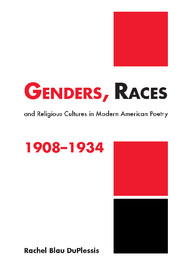Book contents
- Frontmatter
- Contents
- Acknowledgments
- 1 Entitled new: a social philology of modern American poetry
- 2 “Corpses of poesy”: modern poets consider some gender ideologies of lyric
- 3 “Seismic orgasm”: sexual intercourse, its modern representations and politics
- 4 “HOO, HOO, HOO”: some episodes in the construction of modern male whiteness
- 5 “Darken your speech”: racialized cultural work in black and white poets
- 6 “Wondering Jews”: melting-pots and mongrel thoughts
- Notes
- Works Cited
- Index
3 - “Seismic orgasm”: sexual intercourse, its modern representations and politics
Published online by Cambridge University Press: 05 October 2009
- Frontmatter
- Contents
- Acknowledgments
- 1 Entitled new: a social philology of modern American poetry
- 2 “Corpses of poesy”: modern poets consider some gender ideologies of lyric
- 3 “Seismic orgasm”: sexual intercourse, its modern representations and politics
- 4 “HOO, HOO, HOO”: some episodes in the construction of modern male whiteness
- 5 “Darken your speech”: racialized cultural work in black and white poets
- 6 “Wondering Jews”: melting-pots and mongrel thoughts
- Notes
- Works Cited
- Index
Summary
The only point at which the interests of the sexes merge — is the sexual embrace.
Mina Loy, “Feminist Manifesto” (1914)No human act is natural in an unmediated way, and even the most apparently basic and primal, sexual acts, have been constructed of political and ideological meanings. From New Woman and other investigative perspectives, autonomous female desire, the nature and importance of orgasm, possible dangers and pleasures in sexuality were probed from before the very beginning of modernism. For depictions of heterosexual intercourse and sexual desire in modern poetry, Mina Loy's “Songs to Joannes” has both intellectual and historical primacy. It is the work of a certain New Woman subjectivity – “the modern, investigatory, subtly alive, defiantly free woman” (Gregory 1923, 151). Loy“s satiric, ironic, wickedly learned, and passionate voice goes far to destabilize lyric assumptions about the romance plot, female silence, and objectification. The first four sections were published in Others in 1915, and their pretty explicit allusions to lust, to “Pig Cupid … rooting” with its crypt word rutting, to scrotum and testicles (the male “skin-sac”), and to “abortions” startled and scandalized many readers. Loy sees sexuality as a complex of events and meanings, as a site of struggle between genders and among various historically situated desires. Other works besides Loy's – works by Stein, Lawrence, and Pound – draw on the discourses of New Woman/free love and narrate acts of sexual intercourse and even orgasm.
- Type
- Chapter
- Information
- Publisher: Cambridge University PressPrint publication year: 2001



